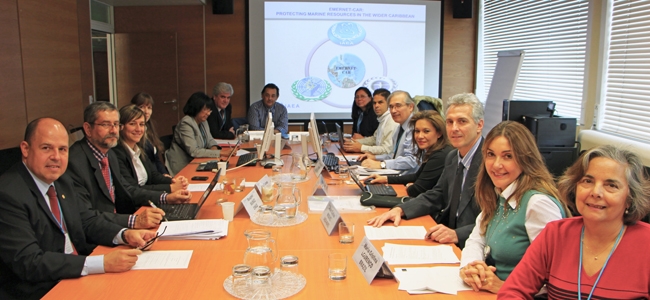11 March, Vienna: ARCAL national coordinators, marine environment experts and specialists in communication have met IAEA and UNEP officers in Vienna to discuss the development of a concrete proposal for an IAEA technical cooperation (TC) project in 2016 that will facilitate cooperation with UNEP in the marine environment.
The IAEA, in collaboration with the regional agreement ARCAL, is exploring cooperation opportunities with UNEP within the frame of an IAEA initiative to support Member States in the Caribbean region in the establishment of an early warning and response system for the region's marine ecosystem. Both the IAEA and UNEP have been cooperating independently with countries in the region for years, each organization working to enhance the analytical capabilities of the region's marine laboratories to monitor water quality, costal sediments and seafood, and to collect information on harmful events that could threaten the marine environment and threaten the use of its resources. Analytical laboratories in the region have also been cooperating among themselves by exchanging experiences and know-how, primarily at the technology and research level.
Under a new initiative to be channelled through the ARCAL agreement, competent authorities in the Caribbean countries would be invited to participate in the establishment of an executive-level network - a network operating at the policy and decision-making level. This network would share customized analytical information, enabling participating countries to monitor the evolution of marine phenomena and to take prompt response action when necessary. The network would draw on sub-regional competencies, but would also benefit from the experience and expertise of other ARCAL countries in the wider Latin America region. Capabilities developed in-country with the support of the IAEA and UNEP would thus be placed at the service of competent authorities to ensure the safe and sustainable utilization of marine resources. Such resources are fundamental to social development and progress in the region - the fisheries and tourism sectors account for the largest percentage of the gross domestic product and employ a large percentage of the labour force in many countries of the wider Caribbean.
The IAEA's marine laboratories, based in Monaco, are responsible for the implementation of a large component of the environmental activities of the IAEA's technical cooperation (TC) programme. In addition, primarily through the TC programme, the IAEA transfers the Monaco laboratories' knowledge and vast experience in the use of nuclear analytical techniques to marine laboratories and research centres in the Caribbean. UNEP has been carrying out similar work using other techniques, in some cases to study the same marine phenomena. Joining IAEA and UNEP forces to create synergies will greatly strengthen the services that both organizations provide to countries in the region, helping them to address development challenges that affect their socioeconomic wellbeing.
The proposed project would be the main vehicle through which the IAEA and ARCAL could cooperate in a wider-ranging UNEP-led environment programme in the region that is supported by the Global Environmental Facility within the general framework of the Cartagena Convention.1
This new initiative has been warmly welcomed by the region's community of marine experts and researchers, who have been participating in several other science and technology-based IAEA TC projects. The network would make a concrete different in putting nuclear science and technology in the service of authorities and end users in key industries and economic sectors of the countries.
1 The Convention for the Protection and Development of the Marine Environment in the Wider Caribbean Region is a comprehensive, umbrella agreement for the protection and development of the marine environment. This regional environmental convention provides the legal framework for cooperative regional and national actions in the WCR. (http://www.cep.unep.org/cartagena-convention)



